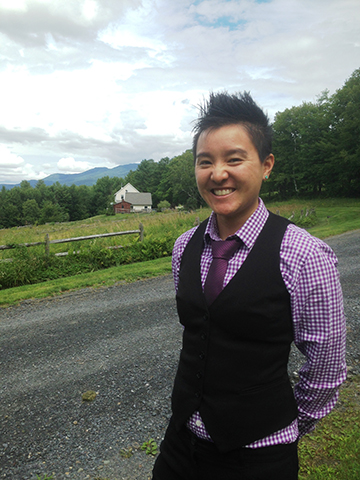 Please give a brief background on yourself and your career.
Please give a brief background on yourself and your career.
I am a changemaker – environmentalist, activist, artist. My work ranges from environmental sustainability and climate change to social/environmental/food justice. I currently work as a CivicSpark Fellow on climate change projects with the City of Emeryville in California and am involved with a number of community/social justice organizations such as Wellesley Underground and API Equality Northern California. In these roles, I get to do both top-down and grassroots bottom-up work for the movement, so it’s all encompassing.
How has your career changed since you originally envisioned it at Wellesley? What other careers did you consider as a student?
I came to Wellesley thinking I’d go into veterinary medicine to work with wildlife or conservation medicine. I gave the dream a lot of serious thought – I majored in biochemistry, took all the pre-vet courses, worked at the Wellesley Cat Hospital, volunteered at Tufts Wildlife Center, and spent a summer in India working with a large animal veterinarian. But ultimately I realized that my main motivation for this was borne out of a desire to work on broader environmental/conservation issues, rather than the specific path of veterinary medicine, so I switched gears my senior year and started looking into environmental science.
I never thought about how involved I could be in my activism or my art back then. It was only after I let go of my veterinary school goal that I had the space to think about other ways to contribute to the world. Even though I became quite active with various social/environmental justice groups and art projects after Wellesley, I didn’t start taking a holistic view of my career/life’s work until this past year.
How has Wellesley contributed to your career?
Wellesley set the foundation in almost every way. I developed very strong research and writing skills that allowed me to publish 10 papers in 5 years and finish my environmental science PhD with flying colors. Although I no longer work with biochemistry content material, my science background makes me very comfortable with data analysis, which helps in my day-to-day work in climate change policy. At the same time, Wellesley taught me to consider multiple perspectives such that I’m not just thinking about the science, but also public health, economics, or social impacts for any given issue.
I had the privilege of receiving scholarships from the CWS and from the Katherine Malone Award to do my research/work in Costa Rica, India, Tibet, and Australia. Without this generous financial support, I undoubtedly would be in a very different place right now. That international experience exposed me to so many new ideas and opened a lot of doors for me.
The Wellesley alumnae community is so, so integral to my career and on-going learning. When I had questions about job interviews or potential career paths, I could always turn to the alums for advice and support. If something was happening out in the world, you can count on alums to share their insight and analysis. I continue to learn every day from my Wellesley siblings on all things, from social justice to science.
What is a typical work day or work week like for you?
During the day as a CivicSpark Fellow, I’m working on anything related to climate action planning. This ranges from installing electric vehicle chargers, building energy efficiency, climate resilient street trees, incentivizing alternative transportation, to environmentally preferable purchasing. We’re working on tangible actions to reduce greenhouse gas emissions to meet California’s stringent targets while trying to shift culture and behavior, so every angle is necessary. Since climate change is so broad reaching, I collaborate a lot with other CivicSpark Fellows as well as Bay Area cities and agencies to find best practices.
Outside of CivicSpark, I’m usually editing a couple of pieces for Wellesley Underground, organizing with API Equality Northern California on the Dragon Fruit Project, working on a painting for Asian Pacific Environment Network or other organizations, and coordinating various community projects that come up.
What piece of advice would you offer students looking to get into your area of interest and expertise?
Read widely, talk to lots of people in the field, and don’t be afraid to try something new. There are many places you can plug in!
What do you wish you had known as a student?
I wish I knew earlier that letting go of what people expect of you and embracing what you want for yourself is a necessary step to living authentically.
If you could come back and take one class at Wellesley what would it be?
I heard that Asian American Studies is now a minor! I’d love to take more classes in the minor, as well as in the women’s and gender studies department.